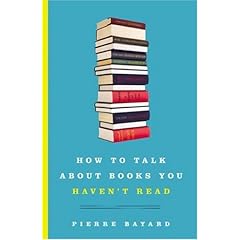 The title of the book ("How to talk about books you haven't read") intrigued me enough that I picked up the book even though it's a translation from French.
The title of the book ("How to talk about books you haven't read") intrigued me enough that I picked up the book even though it's a translation from French.The author, a professor of philosophy, doesn't actually tell you not to read books (at least in the first two chapters that I've read so far). Instead, he says that "reading" comes in shades of gray -- ranging from books you skimmed, or have heard about, to read but have forgotten to books you have read closely. To talk about books, he says, you need only to know the milieu, not the exact contents.
The title is catchy but the actual argument is quite ho-hum. Take for example, John Steinbeck's Grapes of Wrath. I think that I read it when I was in elementary school. Why do I think I have read the book? (1) Because I remember reading about a family driving across the country to California. They stop to fill gas and "let air out of the tires". At the time that I read that (my acquantance with cars was non-existent until I bought my first car in graduate school), I had no idea why anyone would let air out of tires. I still have a lingering memory of the confusion. (2) I have had several conversations about dust bowls and how Steinbeck gave Oklahoma a bum rap. And I do remember reading something about dust settling in on everything. But I could as well have been remembering the Harmattan wind of my West African childhood. (3) I also seem to remember something about locusts and people frying locusts and eating them. Now here's the clincher: Did I actually read all those in Steinbeck's book? Or have I conjured up a memory of the book from other things I've read or encountered? Who knows? These memories fit the impression I have of Steinbeck, and I can talk intelligibly about the atmosphere he evokes ... Why do I have to read Steinbeck's book at this point?
This is Bayard's point, or at least I believe it is -- I've read only 2 chapters of his book so far. Should I read the rest or move on?
No comments:
Post a Comment